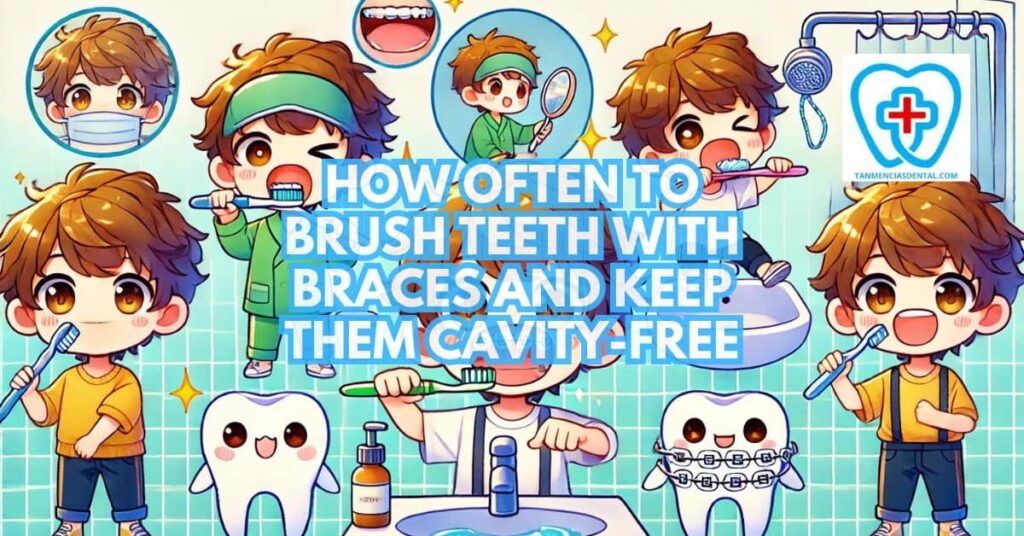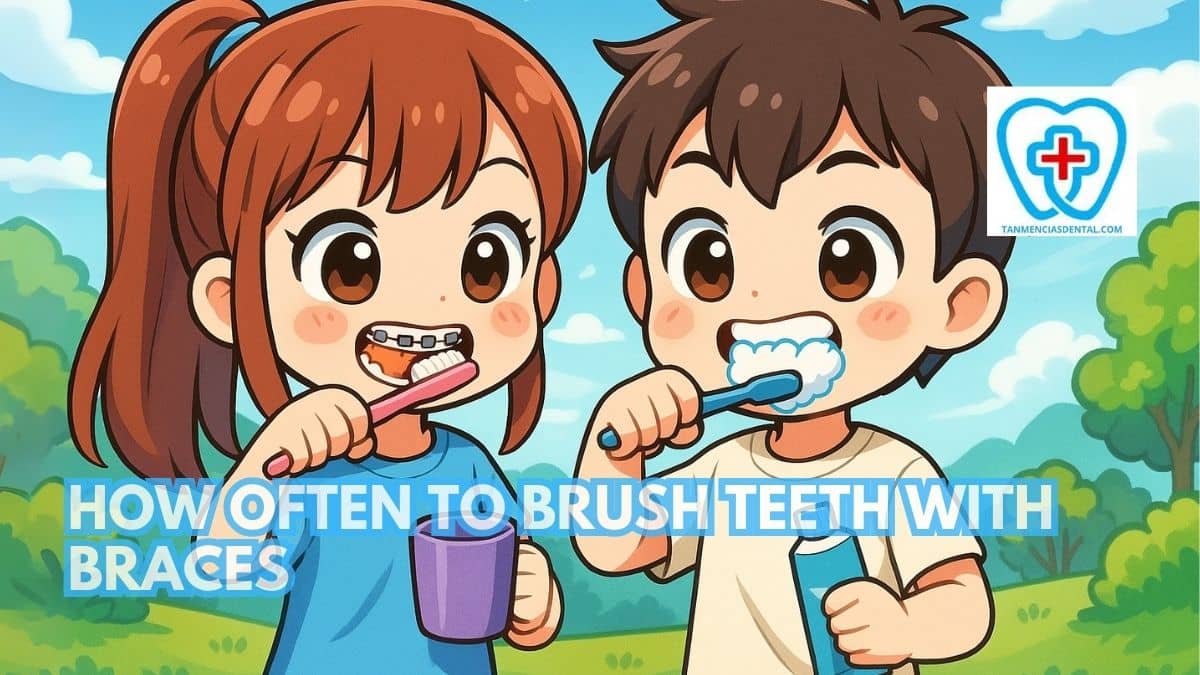Braces make it harder to keep teeth clean because food and plaque can build up around brackets and wires.
If this buildup is not removed, it can lead to cavities, gum problems, and longer treatment times.
Learning how often to brush teeth with braces is important for keeping your mouth healthy and your treatment on track.
A good routine protects your teeth during orthodontic care so they stay strong when the braces come off.
We’ll explain simple steps you can follow to prevent problems and enjoy a clean smile throughout your treatment.
1. Brushing Basics: Brushing Your Teeth Twice a Day with Braces
When you brush your teeth with braces, you need to be more careful because food and plaque can easily get stuck around the brackets and wires.
Dentists recommend brushing at least two times a day, but brushing after each meal is even better for keeping your teeth clean.
Morning tooth brushing after breakfast removes food debris that can stay on your teeth all day if not cleaned.
Brushing at night before bed is also very important because it clears away plaque that builds up while you eat during the day.
Each session should last at least two minutes to make sure every surface of your teeth is covered.
Move your toothbrush slowly around the front, back, and chewing surfaces, paying special attention to the areas near the brackets.
A toothbrush with soft bristles works best because it is gentle on your gums and braces.
If brushing after every meal is not possible, rinsing your mouth with water can help until you can brush again.
Keeping up with proper tooth brushing habits will protect you from cavities and gum disease while wearing braces.
Staying consistent with this routine will also make your teeth look and feel healthier once your orthodontic treatment is complete.
🦷 How a Diet for Gingivitis Can Improve Your Gum Health
2. Braces and Brushing Technique: Angles, Circles, and Gentle Motions
Using the correct technique is crucial for effectively brushing with braces.
Hold your toothbrush at a 45-degree angle to the gum line, which helps clean the area where the teeth and gums meet.
Employ small, circular motions to ensure all surfaces around the braces are reached without applying too much pressure.
Brushing too hard can damage both the braces and your gums, so gentle motions are key.
Pay extra attention to areas around the brackets and wires, as these are prone to plaque buildup.
🦷 Can Mouthwash Cure Sore Throat? Don’t Gargle the Wrong Answer!
3. Power Up Your Clean: Considering an Electric Toothbrush for Braces
An electric toothbrush can significantly improve your oral hygiene routine when you have braces.
Electric toothbrushes often come with features like timers to ensure you brush for the recommended two minutes.
They also provide consistent, gentle brushing motions that are effective for cleaning around braces.
Choose a model with a small, soft-bristled head to reach difficult areas without causing damage.
Some electric toothbrushes have orthodontic-specific brush heads designed to clean effectively around brackets and wires.
🦷 Brushing Away Trouble: Best Toothpaste for Plaque and Gingivitis
4. Flossing with Braces: Essential for Removing Plaque and Food Particles
Flossing is an important part of oral hygiene, especially with braces, because toothbrushes often miss the tight spaces between teeth.
Using a floss threader or orthodontic floss helps guide the string under wires so you can clean thoroughly.
When you floss daily, you lower the risk of gum problems and tooth decay by removing plaque and food particles that stay trapped.
People without braces can floss more easily, but for those with braces, taking the extra time is necessary to keep the mouth healthy.
It is important to be gentle so the wires are not bent and the gums do not become sore.
Flossing also helps prevent bad breath, which can occur when food is left between teeth for too long.
By combining flossing with regular brushing, you create a routine that protects your teeth during orthodontic treatment and leaves them cleaner once the braces are removed.
🦷 Brushing with Confidence: Are Electric Toothbrushes Safe for Kids and Adults?

5. Cleaning Between Braces with Interdental Brushes and Water Flossers
Interdental brushes are small tools that can reach tight spaces between braces and teeth where food often gets stuck.
They are useful for cleaning around brackets and wires that a normal toothbrush may miss.
Water flossers use a stream of water to wash away food and plaque, making them easier to use for some people than regular floss.
Both tools can lower the risk of cavities by keeping hard-to-reach areas clean.
Adding them to your daily routine makes brushing and flossing with braces more effective and less stressful.
🦷 Can Electric Toothbrushes Damage Fillings? Brushing for a Smile, Not a Disaster
6. Fluoride Powerhouse: Using Fluoride Toothpaste to Strengthen Teeth with Braces
Using fluoride toothpaste is crucial for strengthening teeth while wearing braces.
Fluoride helps remineralize enamel, making it more resistant to decay.
Choose a toothpaste with a high fluoride content for maximum protection.
Brush thoroughly to ensure the fluoride reaches all surfaces of your teeth, including those around braces.
Regular use of fluoride toothpaste helps keep your teeth strong and healthy throughout your orthodontic treatment.
🦷 Brushing BFF or Brushing Blocker? The Truth About Mouthwash Before Brushing Teeth
7. Brushing After Orthodontic Adjustments: Special Care for Sore Teeth
Orthodontic adjustments can leave your teeth and gums feeling sore, requiring extra care when brushing.
Use a soft-bristle toothbrush to minimize discomfort while effectively cleaning your teeth.
Avoid vigorous brushing, which can aggravate soreness and cause additional irritation.
Consider rinsing with warm salt water to soothe sore gums and aid in cleaning.
Gentle, thorough brushing after adjustments ensures your teeth remain clean without causing pain.
🦷 Why Understanding Dentist Vs Oral Surgeon Roles Matters for Your Oral Health
8. Brushing On-the-Go: Managing Sticky Snacks with a Travel Toothbrush Kit
Having a travel toothbrush kit on hand is essential for managing oral hygiene when you’re away from home.
Sticky snacks can cling to braces, increasing the risk of plaque buildup and cavities.
A compact travel kit allows you to brush after meals and snacks, maintaining your oral hygiene routine.
Choose a portable toothbrush with soft bristles and a small tube of fluoride toothpaste.
Regular brushing on the go helps keep your teeth and braces clean, preventing potential dental issues.
🦷 Is Your Smile Worth It? Why Dental Care Is So Expensive
9. When Brushing Isn’t Possible: Rinsing Away Food Debris After Meals
Sometimes brushing immediately after meals isn’t possible, but you can still maintain oral hygiene by rinsing your mouth.
Use water or a fluoride mouthwash to rinse away food debris and reduce the risk of plaque buildup.
Swishing vigorously helps dislodge particles stuck around your braces.
This quick action is a useful interim measure until you can brush properly.
Regular rinsing complements your brushing routine, keeping your teeth and braces cleaner between meals.
🦷 Does Salt Water Help With Gingivitis? The Salty Truth About Gum Relief
10. Regular Dental Checkups: Maintaining Oral Hygiene During Orthodontic Treatment
Regular dental checkups are essential for maintaining oral hygiene during orthodontic treatment.
Your dentist can professionally clean areas that are difficult to reach with braces, preventing plaque buildup and cavities.
These checkups also allow your dentist to monitor your overall oral health and make necessary adjustments to your care routine.
Schedule visits every six months or as recommended by your orthodontist.
Consistent professional care ensures your teeth and gums stay healthy throughout your treatment.
🦷 Endodontic And Periodontal Treatment in Marikina
11. Orthodontist-Approved Brushing and Flossing for Optimal Oral Care
Follow your orthodontist’s recommendations for brushing and flossing to achieve the best oral care while wearing braces.
Orthodontics often requires special cleaning routines because brackets and wires make it easier for food and plaque to stay trapped.
Your orthodontist may suggest tools such as interdental brushes, dental floss threaders, or water flossers to reach areas that are hard to clean with a regular toothbrush.
Using orthodontist-approved methods ensures your teeth are cleaned properly without bending wires or loosening brackets.
Regular checkups also allow your orthodontist to review your brushing and flossing habits and give advice if adjustments are needed.
These consultations are important because they make your routine fit your personal needs rather than relying only on general advice.
Following their guidance helps prevent cavities, gum problems, and white spots, leading to healthier teeth during and after orthodontic treatment.
🦷 Trusted Marikina City Family Dentists
👨⚕️ Conclusion
Achieving cavity-free teeth with braces requires a diligent and consistent oral hygiene routine.
Brush and floss daily using the proper techniques and tools to maintain clean teeth and gums.
Don’t skip regular dental checkups, and follow your orthodontist’s advice for optimal care.
Proper maintenance ensures that your teeth will be healthy and strong when your braces are removed.
With commitment and care, you’ll enjoy a beautiful, cavity-free smile at the end of your orthodontic journey.
😊 Self-Promotion
Visit Tan-Mencias Dental Clinic in Parang, Marikina City, for all your dental care needs!
Our friendly and experienced team is dedicated to providing top-notch service to ensure your smile stays healthy and bright.
For any questions or concerns, feel free to call us at 9171451074, send a message through our Facebook page, or use our website’s contact form.
We are here to make your dental experience comfortable and pleasant.
Come and see us for a healthier, happier smile!
❔ FAQs
1. How often should I brush my teeth if I have braces?
You should brush at least twice a day, in the morning and before bed.
Dentists also recommend brushing after every meal if possible, to remove food and plaque that gets stuck around brackets and wires.
If brushing right away is not possible, rinse your mouth with water until you can brush.
Keeping this routine helps prevent cavities and gum problems during treatment.
2. What type of toothbrush is best for braces?
A toothbrush with soft bristles is best because it is gentle on your gums and braces.
A small head makes it easier to reach around brackets and wires.
Some people find electric toothbrushes helpful since they provide steady cleaning motions and built-in timers.
You can also ask your orthodontist if they recommend a brush designed for braces.
3. Do I still need to floss if I brush well with braces?
Yes, flossing is very important even if you brush carefully.
Brushing cannot reach the spaces between your teeth where plaque builds up.
With braces, use a floss threader, orthodontic floss, or a water flosser to make the process easier.
Flossing every day lowers your risk of cavities and gum disease.
4. Can I eat normally while wearing braces?
You can eat many of the foods you enjoy, but it is best to avoid sticky, hard, or chewy foods that can damage braces or stick to them.
Candy, gum, popcorn, and very crunchy snacks can cause problems.
Softer foods like pasta, rice, fruits, and cooked vegetables are easier to eat and safer for your braces.
Choosing the right foods also makes cleaning your teeth easier.
5. Why are regular dental checkups important with braces?
Dental checkups allow your dentist to clean areas you cannot reach on your own.
They also check for early signs of cavities, gum problems, or white spots on your teeth.
These visits help your dentist and orthodontist work together to protect your oral health.
Regular checkups every six months, or as advised, keep your teeth and gums healthy throughout treatment.

